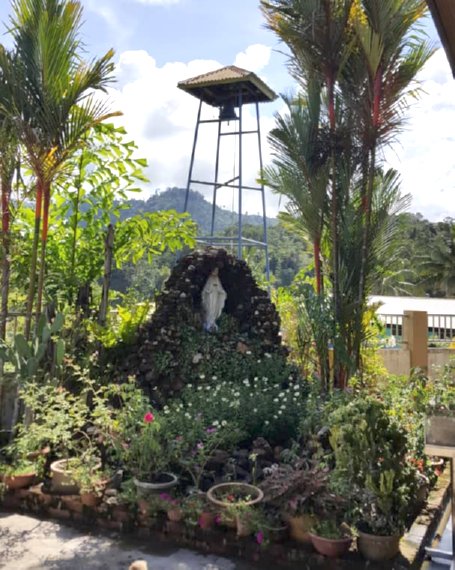Pastoral visit to Gereja Emmanuel, Long Apu and St Paul Church,
Long San 20th - 21st October 2018
Long San 20th - 21st October 2018
The journey by road from Miri to Long Apu took about 5 hours and 20 minutes, a distance of 239.9 km.
Upon arrival at our destination on Saturday 20th October 2018, kampung Long Apu, the community gave Right Reverend Bishop Richard Ng and Fr. Joseph Ding a grand welcome with firecrackers, traditional music, songs and dances. The Bishop then proceeded to the blessing of the new long house site which was under construction.
Tua Kampung Peter Kebing Tingang in his welcome speech mentioned this is the first visit by a Bishop to Long Apu, Uma Pawe. He thanked His Lordship Bishop for making this remarkable day happen. Later the Bishop celebrated sunset Mass accompanied by Fr. Joseph Ding at Gereja Emmanuel with some 200 parishioners followed by welcome party, entertainment, performance and presentation of gifts.
Long Apu is Kenyah longhouse with100% Catholics. The old longhouse 63 doors was originally built way back before 1935 while the new 11 blocks A to K under construction is designed for 121 doors.
The next day On 21st October, the team left Long Apu early morning to Long San parish which is another 6.8 km or 2 and half hours away on off road driving.
Upon arrival the Bishop and Fr. Joseph Ding celebrated Mission Sunday at St Paul Church, Long San with 450 parishioners where 49 students received the Sacrament of Confirmation.
There are 21 longhouses and camps under St Paul Parish, Long San which includes St Anthony Chapel at Kem Kilo 10 which is located 176.3 km from Miri.
Photography and story by Dennis Ng
Edited and compiled by Ben Chang
Welcome at Long Apu - 20th October 2018
The Kenyah traditional attire worn by both male and female as well as young and old are woven with multicolored beads and adorned with the contrast looks usually on a black cloth.
Sleek and beautiful, custom clothing for women is called a Ta and Sepei Sapaq for male.
Ta includes a headgear usually worn by the elderly. Women wearing a Ta is normally complete with decorative bead necklace and beautifully decorated with sequins.
The sedangakan Sepai Sapaq worn by the men is generally very similar to that of the women with colorful motif designs. The elders would wear the Sapag Sepei as a vest (jacket) and his subordinates wear a loincloth called Abet Kabog. Usually the men complement sapaq sapei girded with a saber.
The motif designs on the clothing normally replicate pictures of animals and plants such as tigers and hornbills. If the pictures are of hornbill or a tiger means it is for gentle wear. If the designs are of plants then it is for the ordinary people.
Normally these traditional custom clothing are worn only when celebrating a big event or welcoming distinguish guest.
Blessing of the New Long house -11 block A to k
The old Long house































































